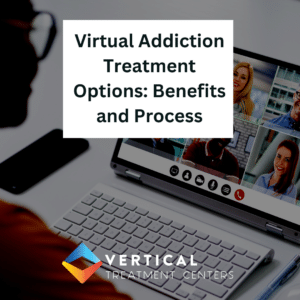
Virtual Addiction Treatment Options: Benefits and Process
In recent years, virtual addiction treatment has become a popular option for people with substance use disorders. This method allows patients to receive treatment through virtual meetings with their healthcare providers, rather than visiting a physical clinic. In this blog post, we’ll discuss the benefits and process of virtual addiction treatment.
The Process
Virtual addiction treatment involves the use of telemedicine to connect patients with healthcare providers. Patients receive sessions through a video conferencing service, over the phone, or through a messaging app.
During virtual treatment sessions, healthcare providers can conduct assessments, provide counseling, prescribe medications, and monitor patients’ progress. Patients can receive similar services to those provided during in-person treatment, with the added benefit of being able to access care from anywhere with an internet connection.
The Benefits of Virtual Addiction Treatment
One of the most significant benefits of virtual addiction treatment is that it eliminates the barriers of time and distance, making it more accessible to those in need of treatment. Patients who live in rural or remote areas can access addiction treatment more easily, as well as those with mobility limitations or transportation challenges.
Virtual addiction treatment also provides a level of confidentiality and privacy that is not always available in traditional in-person treatment. Patients can attend sessions from the comfort and security of their own home, avoiding the stigma or judgment they may experience if they were to attend a physical clinic.
The Negatives of Virtual Addiction Treatment
While virtual addiction treatment has many benefits, it also comes with some potential drawbacks. One of the most significant limitations is that virtual treatment may not be as effective for some patients, particularly those with more severe addiction and co-occurring disorders.
There are also technological barriers that can make virtual addiction treatment challenging. Patients may need access to technology, a reliable internet connection, and privacy during sessions to ensure the treatment is effective and successful.
Conclusion
Virtual addiction treatment is a promising option for people with a substance use disorder. It provides many benefits, including increased accessibility and privacy. However, it may not be the best option for everyone and comes with technological limitations and challenges.
If you’re interested in virtual addiction treatment, speak with your healthcare provider to explore if this option is the right fit for you. Remember, regardless of the treatment approach, seeking professional help is crucial in achieving and maintaining sobriety.
If you’re looking for informative and professional content about data-driven strategies, audience segmentation, and ROI, follow our blog for regular updates and insights.